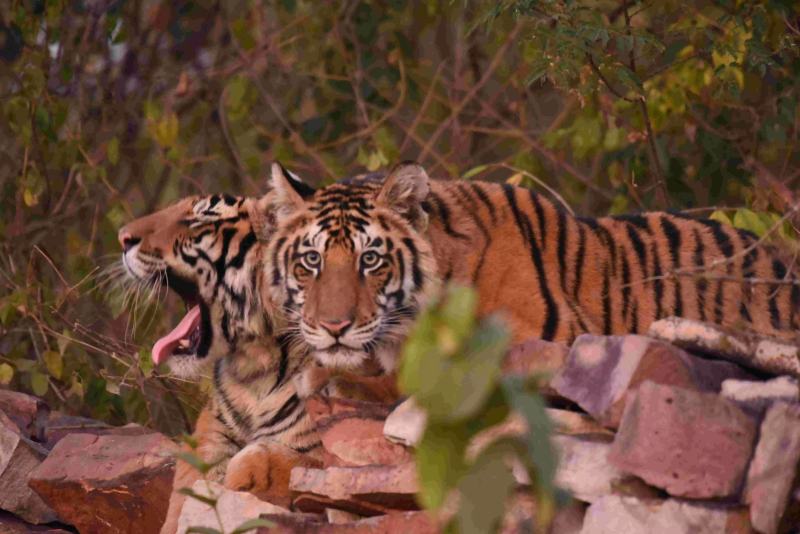Panna, Madhya Pradesh
When six-year-old tigress P-213(32) died in the jungles of Panna, she left behind four cubs. Wildlife lovers were worried about their survival in a hostile environment without their mother around to protect them. “The tigress P-213 (32) died of unknown causes on May 15 this year. Her cubs were only about seven months old then,” Uttam Kumar Sharma, field officer, Panna Tiger Reserve, told Gaon Connection. “To survive in the jungle without the protection of their mother was a big challenge and we were all worried about them,” he said.
There were many suggestions on how to go about protecting them and one of them was to take them to a zoo, but just then a photograph of the orphans playing around with a male tiger surfaced.
According to Uttam Kumar, forest personnel also observed that the male tiger, P-243, the father of the cubs, showed utmost protectiveness for his cubs. This decided the matter and the cubs were allowed to remain in the forests under the care of their Dad.
Also Read: Tiger Dad wins custody of his cubs at Panna Tiger Reserve
The four – three males and one female – cubs are now 15 months old and not only did they survive and thrive, they have also learnt to hunt for themselves. They appear like adult tigers and weigh about 120 kgs, said the field officer. The male cubs are now referred to as P 213-32 (21), P 213-32 (22) and P 213-32 (23), while the female one is P213-32 (24).
According to a forest official, the orphaned cubs learnt the art of survival from the jungle itself. They learnt things that they would never have done in the close confines of a zoo.
“The mother tiger had trained the cubs well before she died. She had marked out the territory within which they could roam and the cubs never transgressed that area. For about 10 months the cubs remained in the one square kilometre that their mother had introduced them to,” the forest official said. The limited area they frequent is called Cube Territory, he explained. But now with increased confidence levels, the tigers roam outside that area too, he said.
“It will not be long before the four tigers will part ways and head out to mark out their own territories,” Uttam Kumar said. They are capable of protecting themselves from bigger animals such as the leopard and the bear. However, they can still be in danger from the other tigers in the jungles of Panna, he said. Meanwhile the tigers are now hunting their own prey such as wild pigs, sambhar, nilgai, etc.
Tiger Dad at work
In the early days after the tigress died, the male tiger P-243 played a significant role in protecting his cubs. He secured the one square kilometre territory for his offspring and kept other tigers and bigger animals that were a threat to them, at bay.
Also Read: Heera and Panna, the inseparable tiger siblings of Panna Tiger Reserve, part ways
P-243 is monitored by the Satellite Collar he wears, and according to field officer Uttam Kumar, the frequency of his appearance in the Cube Territory has gone down, but not stopped entirely.
P-243 has been courting two tigresses, P-142 and P-652. And, he has come into conflict with four other suitors, who are vying for attention from the tigresses. They are P-431, P-241, P-621 and P-271.
However, P-243 has held his own and appears to be winning the battle. Not only that, P-243 has also occupied more territory as his own.
“While P-431 and P- 241 have been observed crossing the area where the cubs are, there has been no report of any conflict with them. The four cubs are safe and healthy,” Uttam Kumar informed Gaon Connection.
The government, during a parliament discussion on tigers, said that in 2020, in the course of human-animal encounters, there were 44 human deaths and 106 tiger deaths in the country which included eight deaths due to poaching.
Read the story in Hindi.



















